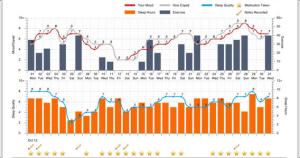How can technology affect the doctor-patient relationship?
November 25, 2014 4 Comments
Medicine is good friends with technology. From electronic blood pressure cuffs to fMRI scanners and robot surgeons, technological innovation has improved investigation, diagnosis and treatment. But what effect could all this bright, shiny equipment have on the most central of medical processes, particularly in psychiatry – the doctor-patient relationship?
When I asked the good people of Twitter for their opinions, two responses were far more common than others:
1) It depends who the technology is designed to help, and who helps design it
2) I wish my consultant would stop using their mobile phone during my appointments
Though the exasperated second point suggests that a piece of new kit could never do anything but get in the way of an essentially human interaction, thankfully it’s the first point which is likely to be the more fruitful answer. Some technologies can help.
Doctor-patient relationship
Take Optimism, for example. It’s a very user-friendly app which allows patients to input data about their symptoms, triggers and other personal criteria on a daily basis. It plots out graphs of this data, allowing trends to evolve – trends which could be useful to look at in clinic. Another digital tool, Buddy, goes one step further. It sends patients text messages asking them how their day has been and to input mood data, and also reminds them of their appointments. That data is available to their therapist, who can get to know the patient quicker and tailor sessions specifically.
Research is broadening these ideas. The AMoSS study, running in Oxford, is using portable devices to record movement, quality of sleep and physiological measurements like blood pressure as well as mood, to create a data set that could be useful come appointment time. GPS trackers are also being trialled to correlate the position of a patient with where they feel worse – meaning they can be advised on where to steer clear of, and even warned of a potential relapse – hopefully strengthening the trust in the clinician.
In fact, simply using text messages by themselves, without an accompanying app interface, can strengthen the doctor-patient relationship. I currently work in a day hospital for people with borderline personality disorder, the duty service of which frequently uses text messages to stay in contact with patients. It can be just the type of attachment system our patients need – available, but never too close.
However, as we can all attest to, technology isn’t always designed with the interests of the patient in mind. Before the rise of computers and ‘paper-free’ work environments, did we really spend as long as we do now filling in questionably useful forms? Risk assessments, child risk assessments, diagnosis tabs, medication tabs, clustering assessments, HONOS assessments…not to mention the bizarre and absurd repetition of printing, faxing and scanning that soaks up hours each week – hours we could be spending more valuably with the patient.
Computer-patient relationship
So it’s all about who the technology is designed to help. But could we push the question further – could technology even replace the doctor-patient relationship?
We already commonly use a computer as a medium for human interaction. The increasing sophistication of online communities like Big White Wall, which allow patients to rely on each other, are an invaluable option for advice and emotional support. And many of us will have heard of Avatar Therapy, a novel modality for helping people take control of their auditory hallucinations by talking to an on-screen avatar puppeted by a human therapist.![]()
And fully computerised therapists are on their way. Online CBT programmes like MoodGym and interactive variants, including those with videos like AI-Therapy, are very popular. Though these programmes are simplistic, other computers are getting better and better at identifying emotions in facial expressions. And even more are passing the Turing Test – fooling humans into thinking that they’re talking to a real person. When combined, the mix of therapy skills, intelligent sensing of emotions and believably human output can be astounding. In fact, research has shown that during a therapy session with a computer avatar ‘therapist’, people will disclose significantly more personal information and show more emotion when they’re told that the avatar was totally driven by code (which it was), compared to if they’re told that there’s a real person pulling the strings. Could the computer-patient relationship come to be the doctor-patient relationship without embarrassment hindering useful discussion?
Profession-patient relationship
We can push the question further in another way – how has technology helped the profession-patient relationship? From my own experience, Twitter has brought me closer to what is important to patients, to the difficulties they face outside of the clinic room, and sometimes, thickening my skin, to what they really think of doctors. Hopefully in return I have been able to give back a balanced, informative, inquisitive and personal face – something I know we often lack. And there are far more prominent psychiatrists than me on Twitter. Having the likes of Simon Wessely and Dinesh Bhugra accessible to anyone who asks a reasonable question is an amazing thing, which can only improve how people think of us.
On a broader scale, television has developed the power to help or hurt the profession-patient relationship in equally powerful measure. Though honest series like Bedlam hopefully made people more attuned to the real us, last year’s Channel 5 series Inside Broadmoor, complete with haunted house music, was less conducive to good feeling.
So there we have it. There is no halting the rise of technology in its influence of the doctor-patient and profession-patient relationships. Who knows where we might be in 20 or 50 years – will there be time for even a handshake amongst all the apps, graphs, texts and tweets? Will human professionals even be required for some patients? As long as we continually remind ourselves of one thing, the future seems to be full of potential – when designing technology for use in mental health services, we have to ask ourselves – who are we doing this for?


The European Psychiatric Association is currently developing and conducting a trial with an app to monitor side effects of antipsychotics. The focus is also on improving patient-doctors relationship an be communication. http://www.psylog.eu/
No, I need to know a human being, to not have that merely confirms that I am not worth the bother of dealing with.
I think technology is a potential danger for psychiatry. If used cautiously and wisely, it can help in some of the more mechanical aspects of data gathering. Expert systems can also be used to refine diagnoses. But the heart of psychiatry is about what it means to be human. You cannot remove or simply simulate the human in real psychiatry.
Unfortunately, with the growing use of computer and mechanical models of brain functioning, many are tempted to see the brain as a machine to be “tuned up” rather than the physical embodiment of a unique, precious, personal human experience.
My PCP uses an electronic record, but my psychiatrist uses a paper chart. I am much more open with my psychiatrist for this very reason – I feel that my information is more protected in a paper chart. There have been way too many problems with patient privacy being compromised with electronic records, and I keep that in mind every time I open my mouth to someone who uses an electronic chart. If my psychiatrist ever switches over to an electronic record, I will no longer see him. I just wouldn’t feel like my privacy is protected.
I don’t need to be able to email or tweet with my psychiatrist. I just need to be able to reach him in an emergency, and he provides a phone number for emergency use. That’s good enough for me.